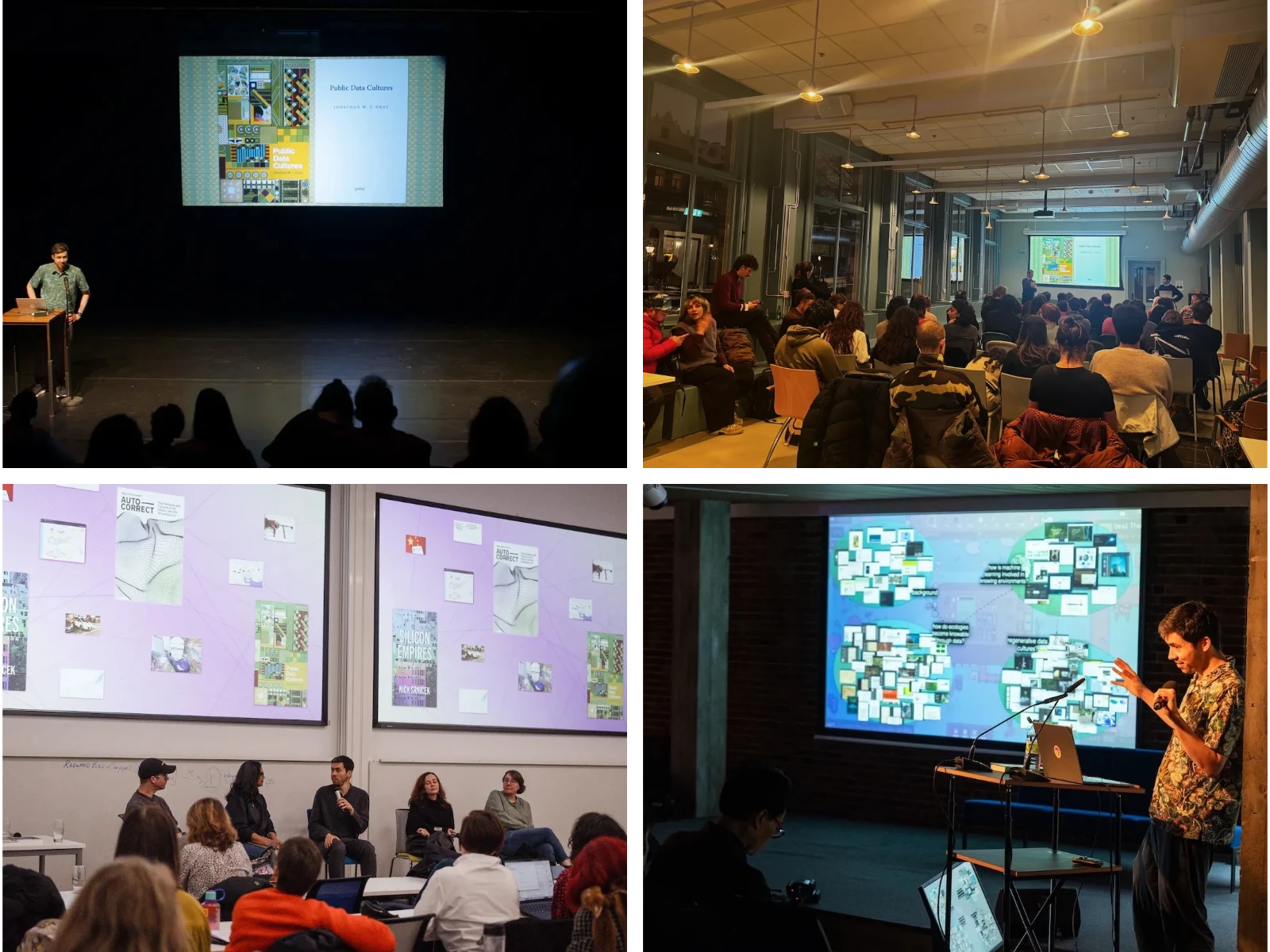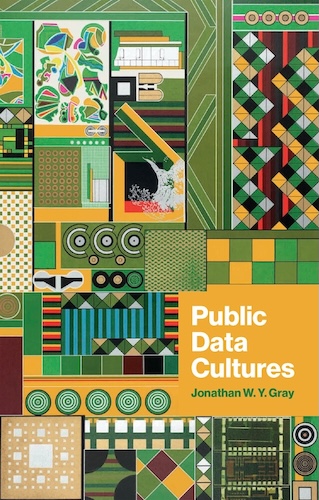Public Data Cultures is now available from Polity. 🎊
It nurtures critical and creative engagements with public data as cultural material, medium of participation and as site of transnational politics
If you’d like to read it you can order it from Bookshop.org (UK), from Bookshop.org (US), request via your library or get a copy at your local bookshop.
reviews
“In an era when ‘data’ seems so often a tool of oppression and control, this book provides a marvellous, salutary exploration of its deployment for social change. This is a core optimistic message for our times; Gray is the ideal guide.” - Geoffrey C. Bowker, UC Irvine
“This is an enchanting guide to a defining phenomenon of digital culture, which shows how different worlds may come about through practising data otherwise.” - Noortje Marres, author of Digital Sociology
“Gray’s book is a fantastic combination of clarity and depth - the meticulous research unfolds into a rich inventory of fresh points about computational culture without ignoring pre-digital formats and cultural practices. This book will be essential reading for critical data studies for years to come and colleagues in media studies, digital design, architecture, and many other fields will get a lot out of it.” - Jussi Parikka, Aarhus University, author of Operational Images
blurb
Public data shapes what we know and how we live together. It is often digital, freely available and related to matters of shared concern, from global warming graphs to collaborative spreadsheets documenting mass layoffs. It circulates via maps and apps which enable us to discover, report and rate what is around us.
Public Data Cultures explores the practices and cultures of how data is made public in the age of the Internet. Looking beyond familiar narratives of data as a resource to be liberated or protected, this book offers new perspectives on public data as networked cultural material, as medium of participation and as site of transnational politics. To better account for how data makes a difference, the book argues for a more expansive conception of what is involved in making data public. In doing so, it focuses not just on removing restrictions but also on caring for arrangements involved in making data public in ways that grow shared understanding and solidarity in responding to the many intersecting troubles of our times.
Nurturing critical and creative engagements with data, this book is essential reading for students and scholars of media, communications, Internet studies, science and technology studies and digital humanities, as well as artists, designers, engineers, reporters, public sector workers, community organisers and activists working with data.
contents
Introduction
I. RECONSIDERING DATA
1. Data as cultural material
2. Data as medium of participation
3. Data as transnational coordination
II. CRITICALLY ENGAGING DATA
4. Missing data and making data
5. Critical data practices
Conclusion
sharing

Any help in sharing the book with friends, colleagues and students who might like it would be much appreciated. 💜
There are posts on:
If you’re organising an event where the book could be relevant, I’d be happy to help arrange flyers with discount codes from the publisher.
For media, event or other inquiries, please feel free to write to me.
I’m collecting pictures of the book living its best life here.
book talks

If you’re potentially interested in hosting a book talk, you can fill in this form.
Upcoming
- book launch at Centre for Interdisciplinary Methodologies, University of Warwick (UK), 4th March 2026
- book event with We All Count (Canada), 6th March 2026
- book talk with Minderoo Centre for Technology & Democracy + CRASSH, University of Cambridge (UK), 9th March 2026
- keynote at Digital Media: Research and Practice symposium at Winchester School of Art, University of Southampton (UK), 12th March 2026
- book talk with Department of Communications and New Media, National University of Singapore (Singapore), 20th March 2026
- book talk and discussion on Public Data Cultures and The Dark Forest Theory of the Internet with Bogna Konior and Accent Sisters (@accentsisters) Gallery and Bookshop, NYC (US), 23rd March 2026
- book talk with Centre for Data, Culture & Society + Critical Data Studies Cluster, University of Edinburgh (UK), 27th March 2026
- book event at DTU (Denmark), 8th April 2026
- book event at Aarhus University (Denmark), 9th April 2026
- book talk and discussion with Cindy Anh Nguyen, Department of Information Studies, UCLA (US), 21st April 2026
Past
- book and practice talk with Creative Computing Institute, University of the Arts London (UK), 25th February 2026
- book talk with Governing the Digital Society (Netherlands), Utrecht University, 10th February 2026
- book launch with Internet Archive Europe (Netherlands), 9th February 2026
- book talk with Critical Data Lab, Humboldt University of Berlin (Germany), 2nd February 2026
- book talk and panel discussion with Digital Good Network (UK), 14th January 2026
- book launch at Digital Methods Winter School 2026, University of Amsterdam (Netherlands), 7th January 2026
- book talk with School of Communications and Arts, University of São Paulo (Brazil), 4th December 2025
- talk at Sciences Po, Paris (France), 2nd December 2025
- joint book launch for Public Data Cultures, Maya Ganesh’s Auto-Correct and Nick Srnicek’s Silicon Empires with Noortje Marres and Joanna Zylinska at King’s College London, 3rd December 2025
- keynote at Mensch Maschine symposium on “Soil, Sound, Memory”, Akademie der Künste, Berlin (Germany), 15th November 2025
- talk on Public Data Cultures at Cultivating Data Natures, Lancaster University (UK), 9th July 2025
- book talk on Public Data Cultures, Fudan University (China), 30th June 2025
- talk on public data cultures, critical data practices and repurposing digital media for collective inquiry at Seoul National University (South Korea), 23rd June 2025
- keynote at The Datafied Web, University of Siegen (Germany), 5-6th June 2025
- book talk on Public Data Cultures, University of Milano-Bicocca (Italy), 22nd May 2025
overview of the book
An excerpt from the introduction:
Data is more than a resource to be unlocked or liberalized. This book aims to unflatten what is involved in public data cultures beyond removing restrictions. It explores practices and arrangements for making data public in the Internet era.
The first section invites reconsideration of public data cultures. To reconsider is to look again, to be receptive and to pay close attention to what might be unexpected or overlooked. Reconsideration can involve un-simplifying, holding multiple things in mind, accommodating tension and trouble, piecing together a more expansive picture. Feminist scholar Donna Haraway writes of troubling as ‘learning to be truly present’ (Haraway, 2016). Fiction can cultivate capacities for reconsideration as a practice of looking closely and rethinking.
In reconsidering public data, we find it is more than unrestricted bundles of facts which point to things. It is more than a resource of designation. The chapters in this section add layers to thicken thinking about what is involved in public data cultures. Chapter 1 looks at cultural histories of data as collections of elements arranged to facilitate calculation, computation and interpretation – from lists to tables, relational databases to interactive visualizations and non-screen-oriented formats for making data experienceable. Chapter 2 examines different ways of doing participation with data, including invitations to take part with data, repurpose data and make data. Chapter 3 explores data as a site of transnational coordination through hashtags, documents, assessment devices and data projects.
The second section explores different ways of critically engaging data. Public data can be critically practised as well as critically studied. This section provides inspiration and starting points for those interested in doing data differently. Chapter 4 looks at data activism and infrastructural imagination, including projects to make data on police killings, multinational tax avoidance and coal power plants. Chapter 5 turns to critical data practices, reviewing approaches described as decolonial, feminist, Indigenous, more-than-human, queer, speculative, thick, warm and weird. The book concludes with a look at the fate of public data in an age of big tech and big AI, and the prospects of other futures.
This book is intended to ferment and feed the reimagination and recomposition of public data cultures. Rather than starting from scratch, how might already-existing arrangements be critically disassembled and creatively recomposed with redistributive and regenerative sensibilities? The chapters of this book are intended to look beyond liberalizing data, towards public data cultures which may be more inventive, purposeful and situationally attuned.
teaching
I’m developing some resources for educators interested in adopting the book for a class.
If you’re interested in teaching with the book, feel free to get in touch.
citation
Gray, J. W. Y. (2025) Public Data Cultures. Cambridge, UK: Polity Books.
- Hardback: 9781509571383
- Paperback: 9781509571390
- ebook: 9781509571543
